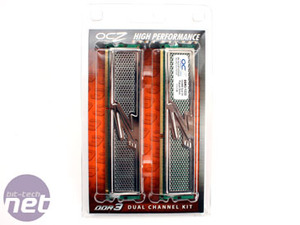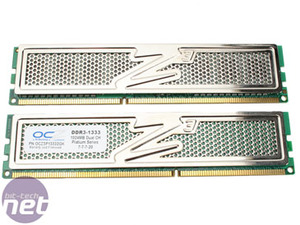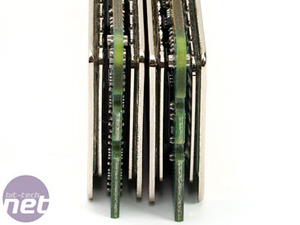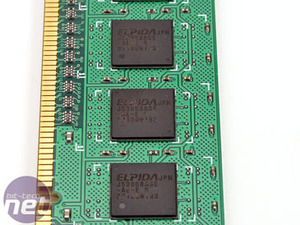OCZ DDR3 PC3-10666 Platinum Edition
Manufacturer: OCZ TechnologyUK Price (as reviewed): £295.83 (inc. VAT)
US Price (as reviewed): $449.99 (ex. Tax)
OCZ on the other hand has gone for a pair of beasty modules sporting the ten-six-sixtysix nomenclature instead. The difference between 1,333MHz and 1,375MHz is a little PR willy waving at most, as a bigger number, however slight, will seem "better" to the consumer. This is regardless of the fact that if you plug in the Kingston modules into any DDR3 system they will run at the exact same speed as these OCZ modules, unless you deliberately overclock of course.
OCZ DDR3 PC3-10666 Platinum Edition Details:
Kit: 2 x 240-pin DDR3 Double Sided DIMMModule Size: 2GB Dual Channel Kit (2 x 1GB)
Module Code: OCZ DDR3 PC3-10666 Platinum Edition
Rated Speed: 1,333MHz DDR3
Rated Timings: 7-7-7-20 (CAS-tRCD-tRP-tRAS)
Rated Voltage: 1.8V with 1.95V EVP
Memory Chips: Elpida
The OCZ Z3s sport virtually the same XTC heatspreaders as the older generation DDR2 Platinum modules, but with an updated "3" embossed into them as well as the traditional Z. This PC3-10666 Platinum series memory needs slightly more voltage than the Kingston at 1.8V, but does offer a unique EVP or Extended Voltage Protection, all the way up to a heavy hitting 1.95V. Theoretically, this should mean there is more room for a greater potential overclock, while still remaining under warranty. On this front, the OCZ memory would appear to be tailored more for enthusiasts than Kingston's PC3-11000 modules.
The XTC heatspreaders do the job just fine, but the surround stuck on top of the mesh feels a bit cheap and plastic. The metal mesh should increase the surface area for cooling but the thermal adhesive underneath stops any direct airflow over the memory chips the mesh implies. This isn't to say we don't like them - despite the fact they won't cool as well as meatier ramsinks from the FlexXLC range, they still look good and are not just "another set of memory with another set of aluminium ramsinks". Instead, OCZ has gone to the effort of making something unique that might or might not be to your tastes aesthetically.
Underneath it all we have the same Elpida BGA memory chips that power both modules.
The Platinum series are designed with performance in mind, whereas the Gold series are more mainstream orientated and offer looser timings of 9-9-9-26. Additionally, the Platinum-series modules don't have Intel XMP (Xtreme Memory Profiles) support like the new Titanium range offers, although XMP will not be available until X38 launches and there's nothing stopping you just overclocking non-XMP modules, just like with EPP.

MSI MPG Velox 100R Chassis Review
October 14 2021 | 15:04













Want to comment? Please log in.